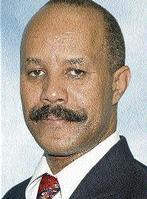Tyrone Reid, Enterprise Reporter

Dr. Alverston Bailey, president of the Medical Association of Jamaica.
"The ministry is not aware of doctors exploiting decentralisation for monetary gain and hence, does not agree with this particular finding in the report."
The Medical Association of Jamaica (MAJ) has been stunned into silence while Health Ministry officials are denying revelations that doctors have been exploiting the decentralisation of the health sector and, in some instances, are making more in overtime and on-call payments than their basic pay.
The disclosures were made in a Government-commissioned report, a copy of which The Sunday Gleaner acquired through the Access to Information Act. The study was done by a Wall Street firm, DAH Consulting, Inc. "It was reported that after decentralisation, there was an exodus of doctors from primary care to hospitals where they could get overtime and on-call allowances that sometimes exceeded their basic pay," stated the report.
Shocked by the severity of the allegations, the MAJ said that it recently received a copy of the report and is preparing to respond. "The matters raised are of such gravity that we need time to study it so we can give an informed response," MAJ president, Dr. Alverston Bailey told The Sunday Gleaner.
Knowledge of
allegation denied
When contacted, the Ministry of Health disagreed with and denied knowledge of the allegation. "The ministry is not aware of doctors exploiting decentralisation for monetary gain and hence, does not agree with this particular finding in the report." But, while denying any knowledge of the alleged exploitation, the Health Ministry partially followed through on a recommendation made by the consultants to place medical doctors on a shift system to reduce overtime and on-call payments. The ministry said that shift systems have been instituted within the accident and emergency departments of some hospitals and are being piloted in select Type C hospitals. The ministry lamented that its efforts to go full scale have been constrained by factors such as a dearth in "the cadre of additional consultants or senior medical officers to manage an additional shift for these medical doctors in all hospitals."
However, The Sunday Gleaner was unable to make a comparison of the overtime and on-call payments before and after the implementation of the decentralised regime, which came into effect in the late 1990s, because the Health Ministry was not able to provide the requisite data. Officials were only able to provide some data they were accumulating from last year, which showed that payments for sessions, emergency and on-call duties amassed to more than half of what the doctors were being paid for salary.
While pointing out that there are doctors who leave both secondary-care and primary-care facilities to either go into post-graduate programmes or abroad, the Health Ministry denied any knowledge of the alleged exodus of doctors from primary-care facilities to hospitals. However, the ministry said that several factors have contributed to a significant increase in the number of doctors employed since decentralisation. Among them are the "significant upgrading of major hospitals such as KPH, Mandeville, May Pen and St. Ann's Bay" and an increase in the size of the graduating class at the University of the West Indies' Medical School.
Difference between salaries
The ministry said that there is a difference between the salaries paid to doctors who work in primary-care facilities and their counterparts who work in the hospitals. However, all doctors are paid at the same rate, depending on their grade.
The ministry also said that doctors who work in hospitals are guaranteed more overtime hours than those in primary care. However, in a bid to level the playing field, doctors in primary care are given a monetary motivator to make up for the unavailability of overtime. "To compensate for the fact that doctors in primary care are not rostered, they are paid an incentive allowance which now ranges from $381,176 to $514,587, depending on the level of the doctor. This allowance is approximately 32.8 per cent of their basic salary."
While the Health Ministry officials admitted that overtime and on-call payments have increased since decentralisation, they argued that increases in the wage rates paid to doctors and a hike in the utilisation of hospitals are contributing factors.

